2022届高考英语语法点梳理专题:主谓一致 课件(18张)
文档属性
| 名称 | 2022届高考英语语法点梳理专题:主谓一致 课件(18张) |
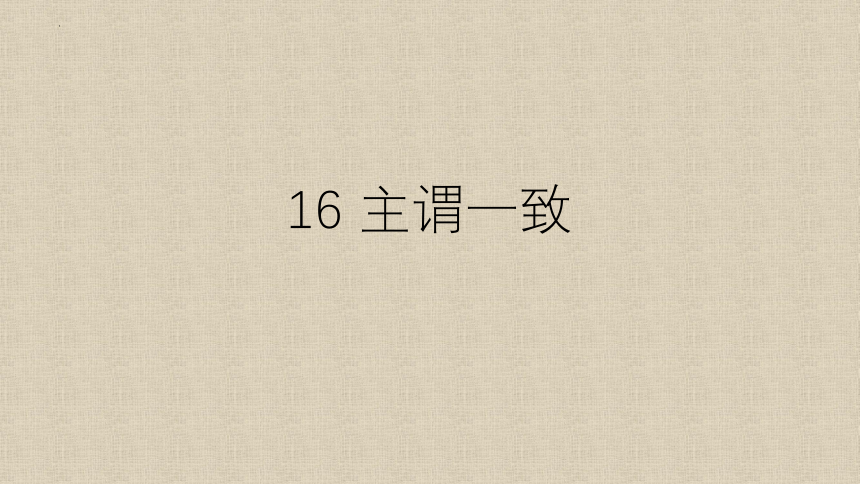
|
|
| 格式 | zip | ||
| 文件大小 | 175.9KB | ||
| 资源类型 | 教案 | ||
| 版本资源 | 通用版 | ||
| 科目 | 英语 | ||
| 更新时间 | 2022-08-04 22:33:09 | ||
图片预览


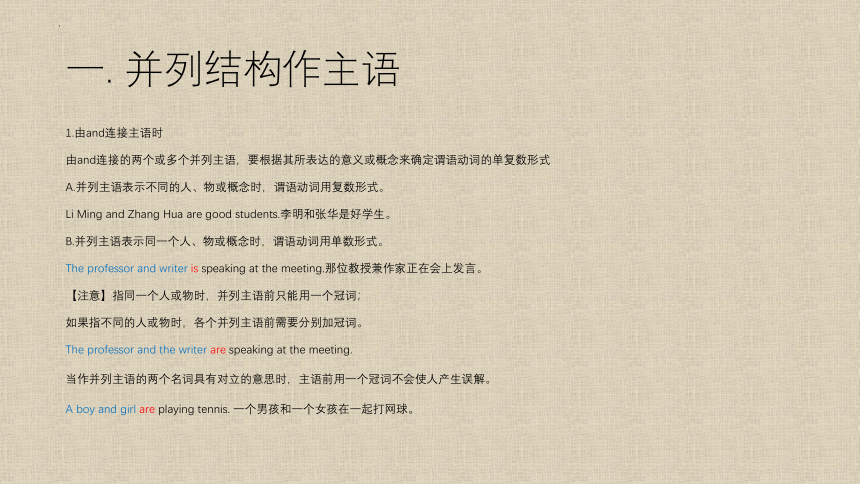
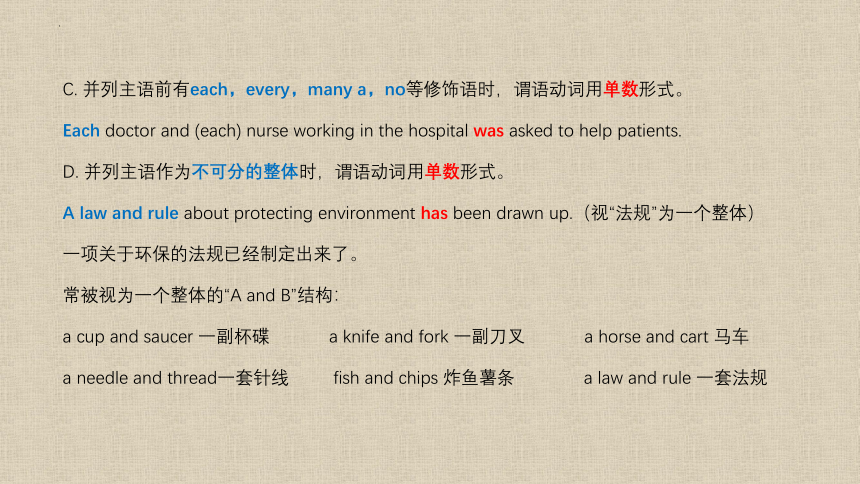
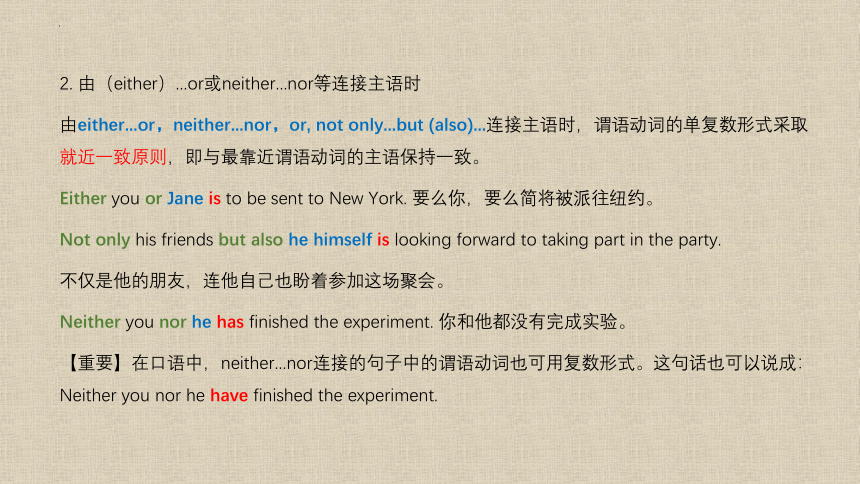
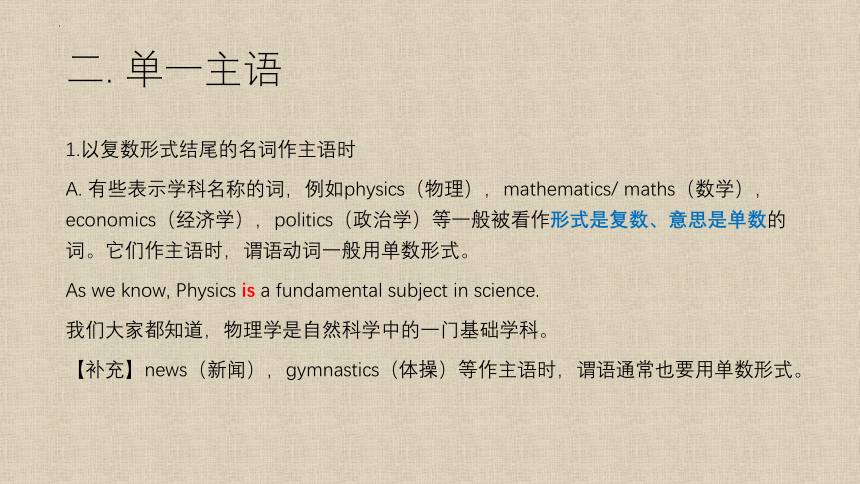
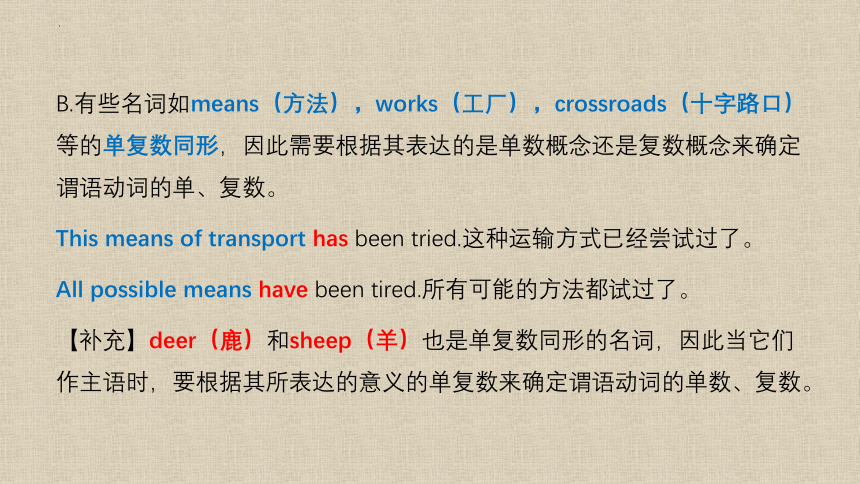
文档简介
(共18张PPT)
16 主谓一致
主谓一致
【定义】英语句子中的谓语动词在人称和数、时态和语态上要和主语保持一致。
1. 并列结构作主语
Either he or I am wrong.不是他错了,就是我错了。
2. 单一主语
The singer and dancer comes from Shanghai.那位歌舞演员来自上海。
3. 特殊情况下的主谓一致
一. 并列结构作主语
1.由and连接主语时
由and连接的两个或多个并列主语,要根据其所表达的意义或概念来确定谓语动词的单复数形式
A.并列主语表示不同的人、物或概念时,谓语动词用复数形式。
Li Ming and Zhang Hua are good students.李明和张华是好学生。
B.并列主语表示同一个人、物或概念时,谓语动词用单数形式。
The professor and writer is speaking at the meeting.那位教授兼作家正在会上发言。
【注意】指同一个人或物时,并列主语前只能用一个冠词;
如果指不同的人或物时,各个并列主语前需要分别加冠词。
The professor and the writer are speaking at the meeting.
当作并列主语的两个名词具有对立的意思时,主语前用一个冠词不会使人产生误解。
A boy and girl are playing tennis. 一个男孩和一个女孩在一起打网球。
C. 并列主语前有each,every,many a,no等修饰语时,谓语动词用单数形式。
Each doctor and (each) nurse working in the hospital was asked to help patients.
D. 并列主语作为不可分的整体时,谓语动词用单数形式。
A law and rule about protecting environment has been drawn up.(视“法规”为一个整体)
一项关于环保的法规已经制定出来了。
常被视为一个整体的“A and B”结构:
a cup and saucer 一副杯碟 a knife and fork 一副刀叉 a horse and cart 马车
a needle and thread一套针线 fish and chips 炸鱼薯条 a law and rule 一套法规
2. 由(either)...or或neither...nor等连接主语时
由either...or,neither...nor,or, not only...but (also)...连接主语时,谓语动词的单复数形式采取就近一致原则,即与最靠近谓语动词的主语保持一致。
Either you or Jane is to be sent to New York. 要么你,要么简将被派往纽约。
Not only his friends but also he himself is looking forward to taking part in the party.
不仅是他的朋友,连他自己也盼着参加这场聚会。
Neither you nor he has finished the experiment. 你和他都没有完成实验。
【重要】在口语中,neither...nor连接的句子中的谓语动词也可用复数形式。这句话也可以说成:Neither you nor he have finished the experiment.
二. 单一主语
1.以复数形式结尾的名词作主语时
A. 有些表示学科名称的词,例如physics(物理),mathematics/ maths(数学),economics(经济学),politics(政治学)等一般被看作形式是复数、意思是单数的词。它们作主语时,谓语动词一般用单数形式。
As we know, Physics is a fundamental subject in science.
我们大家都知道,物理学是自然科学中的一门基础学科。
【补充】news(新闻),gymnastics(体操)等作主语时,谓语通常也要用单数形式。
B.有些名词如means(方法),works(工厂),crossroads(十字路口)等的单复数同形,因此需要根据其表达的是单数概念还是复数概念来确定谓语动词的单、复数。
This means of transport has been tried.这种运输方式已经尝试过了。
All possible means have been tired.所有可能的方法都试过了。
【补充】deer(鹿)和sheep(羊)也是单复数同形的名词,因此当它们作主语时,要根据其所表达的意义的单复数来确定谓语动词的单数、复数。
C. 由两部分组成的物体名词作主语时,谓语动词用复数形式。
My jeans are very tight. 我的牛仔裤很紧。
【注意】如果这些词由单位词(pair,suit,piece,kind等)修饰时,则单位词的单、复数决定谓语动词的单、复数形式。
A pair of scissors is lying in that drawer. 那个抽屉里有一把剪刀。
D. 表示国名、人名、书名、组织机构等的专有名词作主语时,即使形式上是复数,谓语动词也要用单数形式。
The United States is a developed country.美国是一个发达国家。
The New York Times is widely read in the world.《纽约晚报》在世界上被广泛阅读。
E. 以-s结尾的表示群岛、山脉、海峡、瀑布等的专有名词作主语时,谓语动词用复数形式。
The Himalayas have a magnificent variety of plants. 喜马拉雅山脉上的植物种类繁多。
The Niagara Falls are splendid waterfalls. 尼亚加拉大瀑布是美丽的瀑布。
【注意】以下是一些以-s结尾的名词,它们作主语时,谓语用复数形式。
belongings 财产 clothes 衣服 earnings 收入 goods 货物 leavings 剩余 savings 储蓄
2. 集体名词作主语时
A. mankind,humanity,man作主语时,谓语动词一般用单数形式。
Only man knows how to cook.只有人类懂得烹饪。
B. people,police,cattle,youth等作主语时,谓语动词用复数形式。
The police are investigating the riot.警察在调查这起暴乱事件。
C. 集体名词army,assembly,audience,band,club,committee,company,congress,crew,crowd,enemy,family,gang,government,group,herd,jury,population,public,team等作主语时,若强调整体,谓语动词用单数形式;若强调个体,谓语动词用复数形式。
The family is going to move to New York.(强调整体)这一家要搬到纽约去。
The family have different opinions about their going abroad.
(强调家庭成员)这一家人对搬往国外持有不同的看法。
3.非谓语动词形式或从句作主语时
A. 非谓语动词形式或从句作主语时,谓语动词一般用单数形式。
To improve agricultural land needs a lot of money.(不定式作主语)
Swimming is a good way to keep health.(动词-ing形式作主语)游泳是个健身的好方法。
How they will solve the problem remains to be seen.(从句作主语)他们怎样解决这个问题还需拭目以待。
B. 多个非谓语动词或从句作主语时,如果表达的是一个概念,谓语动词就用单数形式;如果表达的是不同的概念,谓语动词就用复数形式。
Going to bed early and getting up early is good for your health. 早睡早起有益于身体健康。
(表达一个概念)
Reading books and playing table tennis are my great pleasure.读书、打乒乓球是我最大的快乐。
(表达两个概念)
三、其他情况的主谓一致
1.表示距离等的复数名词作主语时
表示距离、时间、长度、金额、质量等的复数名词作主语时,常被看作整体,谓语动词通常用单数形式。这类复数名词有:miles,dollars,pounds,kilograms,kilometres,centimetres,millimetres,seconds,hours,years等。
Five dollars seems a fair price.5美元是个公道的价格。
【注意】算式中的谓语动词一般用单数形式,有时也可以用复数形式。
Five times eight is/are forty.5乘以8等于40。
如果强调数目,谓语动词用复数。
One hundred cents make a dollar.100美分就是一美元。
2.everyone等不定代词作主语时
everyone,something等不定代词作主语时,谓语动词用单数形式。
Everyone in the class was surprised at the news. 听到这则消息,班里每一个人都震惊了。
3.(each) one of...结构作主语时
each one of...,every one of...,anyone of...等结构作主语时,谓语动词用单数形式
Each of the girls in our class has a balloon. 我们班的每个女孩都有一个气球。
【说明】of之后的复数名词不是主语而是介词of的宾语,而of前面的one,every one等才是主语,因此谓语动词用单数形式。
Each/Every boy in our class has a skateboard. 我们班的每个男孩都有一副滑板。
They each have a skateboard. 他们每个人都有一副滑板。
【重要】each和every修饰主语时,谓语动词用单数形式;但each作复数主语的同位语时,谓语动词用复数形式。
4.none of...结构作主语时
None + of+不可数名词+谓语动词的单数形式
None of that money in the desk is his.(不可数名词)书桌里的那笔钱不是他的。
None/neither/either + of+可数名词复数/复数代词+谓语动词的单数或复数形式
Either of the qualifications is/are acceptable.
=Either qualification is acceptable.两种资格证明之中的任何一种都可以接受。
【注意】neither或either作形容词与单数名词连用,谓语动词用单数。
5.分数/百分数+of...结构作主语时
分数/百分数+of+复数名词/复数代词+谓语动词的复数形式
Two thirds of the students support the plan.三分之二的学生支持这项计划。
分数/百分数+of+单数名词/单数代词/不可数名词+谓语动词的单数形式
Three fourths of the surface of the earth is sea.地球表面四分之三是海洋。
6.more (...) than one...结构作主语时
more (...) than one+单数名词+谓语动词的单数形式
more+复数名词+than one+谓语动词的复数形式
More than one white rose has bloomed in the garden.
=More white roses than one have bloomed in the garden.花园里不止一朵白玫瑰开花了。
More than two white roses have bloomed.已经有两朵以上的白玫瑰开花了。
7. a/the number of...结构作主语时
【区别】a number of意为“许多”;the number of意为“……的数目”。
a number of+复数名词+谓语动词的复数形式
the number of+复数名词+谓语动词的单数形式
A number of trees are green in April.四月里许多树都绿了。
The number of students in the computer class is limited to ten. 上计算机课的学生数目被限定为10。
8. there/here...引导句子时
由there和here引导的句子,主语不止一个时,谓语动词一般和邻近的那个主语保持一致。(就近原则)
There are some chairs and a table in the room.
=There is a table and some chairs in the room. 房间里有一些椅子和一张桌子。
9.“A+with/but等+B”结构作主语时(就远原则)
当主语后面接用来说明主语的修饰语,如with,along with,together with,but,besides,except,like,including,in addition to,as well as,rather than等时,谓语动词不受修饰成分的影响,仍然同主语保持一致。即“A+with/but/as well as+B”作主语时,谓语动词的单复数形式与A保持一致。
A library with five thousand books is offered to the nation as a gift.
一座有5000册书的图书馆被作为礼物送给了这个国家。
10.“the+形容词”作主语时
“the+形容词”作主语时,需根据情况确定谓语动词的单复数。当表示一类人时,谓语动词用复数形式;当表示抽象概念时,谓语动词用单数形式。这类形容词有old,young,living,dead,rich,poor,deaf,blind,dumb等。
The injured were carried away on stretchers.受伤的人被人用担架给抬走了。
The unknown is always something to be feared.未知的东西总是令人害怕。
Quiz
1. The girl as well as the other students __________ excited.
A. was B. were C. being D. be
2. The __________ we saw yesterday come out to the farm once in a while.
A. cow B. dog C. horse D. deer
3. Large amounts of water __________ polluted since the factory was built last year.
A. was B. were C. have been D. has been
A
D
C
16 主谓一致
主谓一致
【定义】英语句子中的谓语动词在人称和数、时态和语态上要和主语保持一致。
1. 并列结构作主语
Either he or I am wrong.不是他错了,就是我错了。
2. 单一主语
The singer and dancer comes from Shanghai.那位歌舞演员来自上海。
3. 特殊情况下的主谓一致
一. 并列结构作主语
1.由and连接主语时
由and连接的两个或多个并列主语,要根据其所表达的意义或概念来确定谓语动词的单复数形式
A.并列主语表示不同的人、物或概念时,谓语动词用复数形式。
Li Ming and Zhang Hua are good students.李明和张华是好学生。
B.并列主语表示同一个人、物或概念时,谓语动词用单数形式。
The professor and writer is speaking at the meeting.那位教授兼作家正在会上发言。
【注意】指同一个人或物时,并列主语前只能用一个冠词;
如果指不同的人或物时,各个并列主语前需要分别加冠词。
The professor and the writer are speaking at the meeting.
当作并列主语的两个名词具有对立的意思时,主语前用一个冠词不会使人产生误解。
A boy and girl are playing tennis. 一个男孩和一个女孩在一起打网球。
C. 并列主语前有each,every,many a,no等修饰语时,谓语动词用单数形式。
Each doctor and (each) nurse working in the hospital was asked to help patients.
D. 并列主语作为不可分的整体时,谓语动词用单数形式。
A law and rule about protecting environment has been drawn up.(视“法规”为一个整体)
一项关于环保的法规已经制定出来了。
常被视为一个整体的“A and B”结构:
a cup and saucer 一副杯碟 a knife and fork 一副刀叉 a horse and cart 马车
a needle and thread一套针线 fish and chips 炸鱼薯条 a law and rule 一套法规
2. 由(either)...or或neither...nor等连接主语时
由either...or,neither...nor,or, not only...but (also)...连接主语时,谓语动词的单复数形式采取就近一致原则,即与最靠近谓语动词的主语保持一致。
Either you or Jane is to be sent to New York. 要么你,要么简将被派往纽约。
Not only his friends but also he himself is looking forward to taking part in the party.
不仅是他的朋友,连他自己也盼着参加这场聚会。
Neither you nor he has finished the experiment. 你和他都没有完成实验。
【重要】在口语中,neither...nor连接的句子中的谓语动词也可用复数形式。这句话也可以说成:Neither you nor he have finished the experiment.
二. 单一主语
1.以复数形式结尾的名词作主语时
A. 有些表示学科名称的词,例如physics(物理),mathematics/ maths(数学),economics(经济学),politics(政治学)等一般被看作形式是复数、意思是单数的词。它们作主语时,谓语动词一般用单数形式。
As we know, Physics is a fundamental subject in science.
我们大家都知道,物理学是自然科学中的一门基础学科。
【补充】news(新闻),gymnastics(体操)等作主语时,谓语通常也要用单数形式。
B.有些名词如means(方法),works(工厂),crossroads(十字路口)等的单复数同形,因此需要根据其表达的是单数概念还是复数概念来确定谓语动词的单、复数。
This means of transport has been tried.这种运输方式已经尝试过了。
All possible means have been tired.所有可能的方法都试过了。
【补充】deer(鹿)和sheep(羊)也是单复数同形的名词,因此当它们作主语时,要根据其所表达的意义的单复数来确定谓语动词的单数、复数。
C. 由两部分组成的物体名词作主语时,谓语动词用复数形式。
My jeans are very tight. 我的牛仔裤很紧。
【注意】如果这些词由单位词(pair,suit,piece,kind等)修饰时,则单位词的单、复数决定谓语动词的单、复数形式。
A pair of scissors is lying in that drawer. 那个抽屉里有一把剪刀。
D. 表示国名、人名、书名、组织机构等的专有名词作主语时,即使形式上是复数,谓语动词也要用单数形式。
The United States is a developed country.美国是一个发达国家。
The New York Times is widely read in the world.《纽约晚报》在世界上被广泛阅读。
E. 以-s结尾的表示群岛、山脉、海峡、瀑布等的专有名词作主语时,谓语动词用复数形式。
The Himalayas have a magnificent variety of plants. 喜马拉雅山脉上的植物种类繁多。
The Niagara Falls are splendid waterfalls. 尼亚加拉大瀑布是美丽的瀑布。
【注意】以下是一些以-s结尾的名词,它们作主语时,谓语用复数形式。
belongings 财产 clothes 衣服 earnings 收入 goods 货物 leavings 剩余 savings 储蓄
2. 集体名词作主语时
A. mankind,humanity,man作主语时,谓语动词一般用单数形式。
Only man knows how to cook.只有人类懂得烹饪。
B. people,police,cattle,youth等作主语时,谓语动词用复数形式。
The police are investigating the riot.警察在调查这起暴乱事件。
C. 集体名词army,assembly,audience,band,club,committee,company,congress,crew,crowd,enemy,family,gang,government,group,herd,jury,population,public,team等作主语时,若强调整体,谓语动词用单数形式;若强调个体,谓语动词用复数形式。
The family is going to move to New York.(强调整体)这一家要搬到纽约去。
The family have different opinions about their going abroad.
(强调家庭成员)这一家人对搬往国外持有不同的看法。
3.非谓语动词形式或从句作主语时
A. 非谓语动词形式或从句作主语时,谓语动词一般用单数形式。
To improve agricultural land needs a lot of money.(不定式作主语)
Swimming is a good way to keep health.(动词-ing形式作主语)游泳是个健身的好方法。
How they will solve the problem remains to be seen.(从句作主语)他们怎样解决这个问题还需拭目以待。
B. 多个非谓语动词或从句作主语时,如果表达的是一个概念,谓语动词就用单数形式;如果表达的是不同的概念,谓语动词就用复数形式。
Going to bed early and getting up early is good for your health. 早睡早起有益于身体健康。
(表达一个概念)
Reading books and playing table tennis are my great pleasure.读书、打乒乓球是我最大的快乐。
(表达两个概念)
三、其他情况的主谓一致
1.表示距离等的复数名词作主语时
表示距离、时间、长度、金额、质量等的复数名词作主语时,常被看作整体,谓语动词通常用单数形式。这类复数名词有:miles,dollars,pounds,kilograms,kilometres,centimetres,millimetres,seconds,hours,years等。
Five dollars seems a fair price.5美元是个公道的价格。
【注意】算式中的谓语动词一般用单数形式,有时也可以用复数形式。
Five times eight is/are forty.5乘以8等于40。
如果强调数目,谓语动词用复数。
One hundred cents make a dollar.100美分就是一美元。
2.everyone等不定代词作主语时
everyone,something等不定代词作主语时,谓语动词用单数形式。
Everyone in the class was surprised at the news. 听到这则消息,班里每一个人都震惊了。
3.(each) one of...结构作主语时
each one of...,every one of...,anyone of...等结构作主语时,谓语动词用单数形式
Each of the girls in our class has a balloon. 我们班的每个女孩都有一个气球。
【说明】of之后的复数名词不是主语而是介词of的宾语,而of前面的one,every one等才是主语,因此谓语动词用单数形式。
Each/Every boy in our class has a skateboard. 我们班的每个男孩都有一副滑板。
They each have a skateboard. 他们每个人都有一副滑板。
【重要】each和every修饰主语时,谓语动词用单数形式;但each作复数主语的同位语时,谓语动词用复数形式。
4.none of...结构作主语时
None + of+不可数名词+谓语动词的单数形式
None of that money in the desk is his.(不可数名词)书桌里的那笔钱不是他的。
None/neither/either + of+可数名词复数/复数代词+谓语动词的单数或复数形式
Either of the qualifications is/are acceptable.
=Either qualification is acceptable.两种资格证明之中的任何一种都可以接受。
【注意】neither或either作形容词与单数名词连用,谓语动词用单数。
5.分数/百分数+of...结构作主语时
分数/百分数+of+复数名词/复数代词+谓语动词的复数形式
Two thirds of the students support the plan.三分之二的学生支持这项计划。
分数/百分数+of+单数名词/单数代词/不可数名词+谓语动词的单数形式
Three fourths of the surface of the earth is sea.地球表面四分之三是海洋。
6.more (...) than one...结构作主语时
more (...) than one+单数名词+谓语动词的单数形式
more+复数名词+than one+谓语动词的复数形式
More than one white rose has bloomed in the garden.
=More white roses than one have bloomed in the garden.花园里不止一朵白玫瑰开花了。
More than two white roses have bloomed.已经有两朵以上的白玫瑰开花了。
7. a/the number of...结构作主语时
【区别】a number of意为“许多”;the number of意为“……的数目”。
a number of+复数名词+谓语动词的复数形式
the number of+复数名词+谓语动词的单数形式
A number of trees are green in April.四月里许多树都绿了。
The number of students in the computer class is limited to ten. 上计算机课的学生数目被限定为10。
8. there/here...引导句子时
由there和here引导的句子,主语不止一个时,谓语动词一般和邻近的那个主语保持一致。(就近原则)
There are some chairs and a table in the room.
=There is a table and some chairs in the room. 房间里有一些椅子和一张桌子。
9.“A+with/but等+B”结构作主语时(就远原则)
当主语后面接用来说明主语的修饰语,如with,along with,together with,but,besides,except,like,including,in addition to,as well as,rather than等时,谓语动词不受修饰成分的影响,仍然同主语保持一致。即“A+with/but/as well as+B”作主语时,谓语动词的单复数形式与A保持一致。
A library with five thousand books is offered to the nation as a gift.
一座有5000册书的图书馆被作为礼物送给了这个国家。
10.“the+形容词”作主语时
“the+形容词”作主语时,需根据情况确定谓语动词的单复数。当表示一类人时,谓语动词用复数形式;当表示抽象概念时,谓语动词用单数形式。这类形容词有old,young,living,dead,rich,poor,deaf,blind,dumb等。
The injured were carried away on stretchers.受伤的人被人用担架给抬走了。
The unknown is always something to be feared.未知的东西总是令人害怕。
Quiz
1. The girl as well as the other students __________ excited.
A. was B. were C. being D. be
2. The __________ we saw yesterday come out to the farm once in a while.
A. cow B. dog C. horse D. deer
3. Large amounts of water __________ polluted since the factory was built last year.
A. was B. were C. have been D. has been
A
D
C
